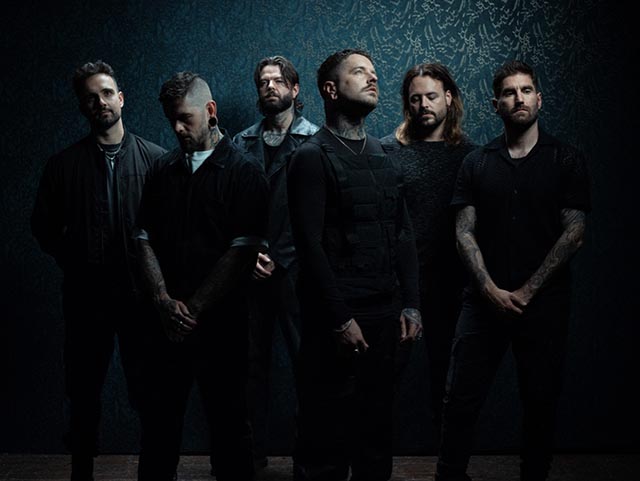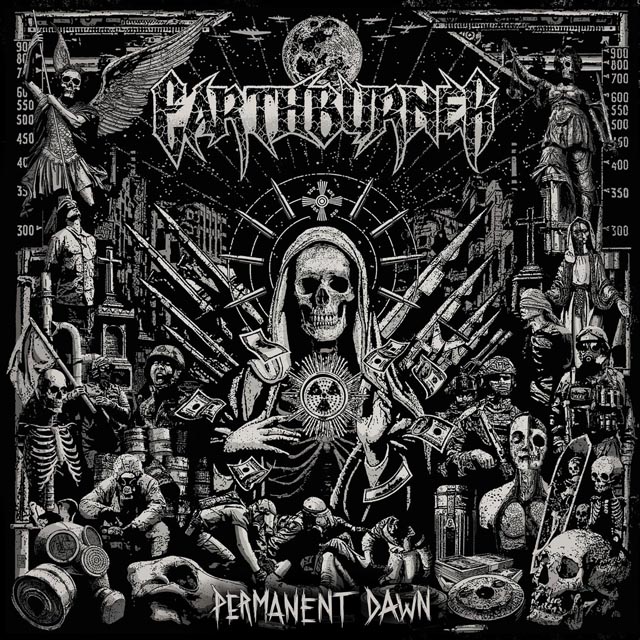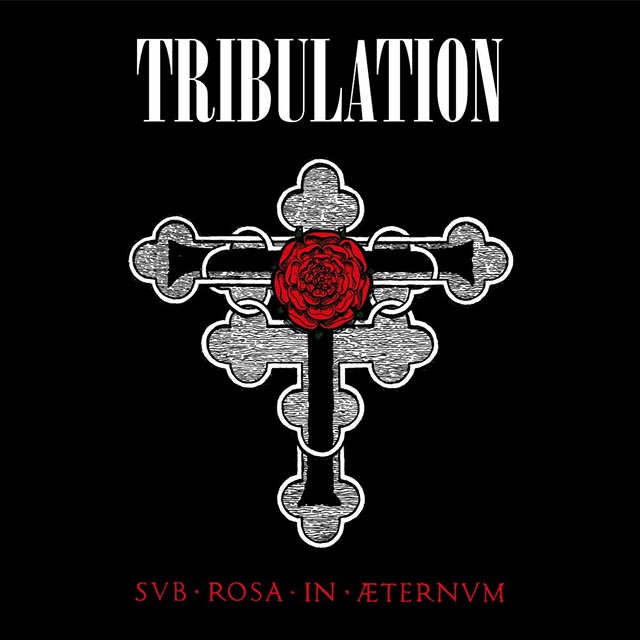 Lamb Of God has been on the road supporting 2009’s Wrath non-stop since its release. Yet despite finally getting much deserved down time, drummer Chris Adler is keeping himself busy. In the past month alone, Adler has formed his own label ReThink Records and has published his own book The Making Of Lamb Of God New American Gospel: Drum Tablature, Short Stories and Reflections. And if that wasn’t enough, Adler is about to embark on the Throne With A View drum clinic tour, beginning February 28 in Salt Lake City, Utah and ending on March 16 in Hollywood, FL. Adler took the time to talk with Metal Insider about not only his new book and tour, but also the hardships fans often don’t see successful recording and touring metal musicians go through.
Lamb Of God has been on the road supporting 2009’s Wrath non-stop since its release. Yet despite finally getting much deserved down time, drummer Chris Adler is keeping himself busy. In the past month alone, Adler has formed his own label ReThink Records and has published his own book The Making Of Lamb Of God New American Gospel: Drum Tablature, Short Stories and Reflections. And if that wasn’t enough, Adler is about to embark on the Throne With A View drum clinic tour, beginning February 28 in Salt Lake City, Utah and ending on March 16 in Hollywood, FL. Adler took the time to talk with Metal Insider about not only his new book and tour, but also the hardships fans often don’t see successful recording and touring metal musicians go through.
What inspired you to write and release The Making of Lamb of God New American Gospel: Drum Tablature, Short Stories and Reflections?
A couple of things. I met up with Paul Waggoner, who plays guitar in Between The Buried And Me, and he and I have become good friends. He did a tab book for them, and I thought it was just a cool idea to have stuff done by the actual guys in the band as supposed to letting somebody else do it. I’ve seen a lot of things that have been done by the big companies and they’re all kind of wrong and no one really checks with the artists. So I really liked that he had did that himself, and I was interested in that part of it. But also, at the same time, I was starting to write down sort of the early memories that I had of the band just for myself and maybe for my kids to read one day, or anybody who may come upon it. So I figured why not collage it together and put it out there? I never really had the idea of putting out a book for sale. Both were kind of just separate ideas that came together in the end. So I began talking to Paul from Between The Buried And Me and some other people, and it seemed like something that maybe more than my kids would be interested in, something that other drummers might be interested in checking out as well. So that’s how it came to be.
I know the intention is to do a book for each Lamb Of God album, but was there a reason why you decided to focus first on New American Gospel?
Yeah, there’s a whole lot of reasons why I should not have done that. I mean, it’s certainly our least popular album. But honestly, I didn’t set out to write a book to sell a book, or make a million dollars. I just wanted to write all of this stuff down before I forgot it. And for anyone who was interested in the music, I wanted to make sure that it was a reliable source. And as far as where I started, I mean I guess I should have started with a Burn The Priest [the name the band went under prior to Lamb Of God] book, but I really wanted to start with the beginnings of the band and where our heads were at, or where my head was at, when that time came. So really the only reason why I started there was because going forward historically, that would have, for me anyway, been the logical starting place for the band.
Is there a particular moment or memory from the New American Gospel recording sessions that really stands out for you?
There was, yeah. There was a point during the recording process where it seemed very unlikely that we were going to finish. It was a very high stress environment. We were, as I mention in the book, really trying to shove an elephant into a hamster cage, and we really didn’t have enough money at the time, experience, anything out there. We were equipped with nothing to do the job of an army. And we had great songs and a great product, but it was very, very difficult to get to the finish line. And there was one point where I had been staying up for days on end and was about to – because the drums were done and I didn’t have to worry about performing anymore, but it was becoming obvious that we weren’t going to finish it. I was panicked that the record company was going to sue us, or going to kill us or whatever! It was our first record deal. I didn’t know how things worked. There was a point where I had been staying up for so long and the guys knew that I was kind of losing my mind a bit. So they handed me a microphone, sent me into the closet of tracking room and told me just to let it out. It was just me screaming on the floor in a fetal position about how frustrated and disappointed I was. Just yelling! And that’s actually in the intro to “Black Dahlia.” You can hear this screaming in the background, and that’s actually me in the closet. So yeah, it was probably not as much fun as people thought it was to make an album at the time for us.
A lot of what I talk about in the book covers challenges, hurdles, and frustrations. A lot of people think that when a band puts out an album, that’s what the band wants it to be like and it’s their piece of art. And when they think of how, if they were in the band, they would’ve done it differently, like how the guitars are too loud or you can’t hear the cymbals, and then ask “why would they do that?” Well, we had a shoestring budget, very little time and everyone is losing their mind working 48 hours straight. So in the same way with the DVDs, I wanted to shed a little light on the reality of the situation. I wanted to let that out there as well.
When recording, what’s the largest hurdle you have to overcome?
Wow, that’s tough! I think that it changes on the situation of the band. For us today, it’s a totally different world. Technology has really caught up with creativity, so that anybody can make a really great sounding album. At the time that we made that album, we wanted to record to tape. We didn’t have a full studio. We had a shoestring budget that only allowed us seven days in the studio. I don’t mean to sound like I’m complaining about it because it was the standard for anybody at the time. I just think that it’s very, very difficult to create under pressure like that. It’s kind of like going to a painter and saying “I need a masterpiece in a week!” It might be pretty good, it might not be if they’re functioning off of those kinds of conditions/pressures, and keeping everybody on the same page with the same goal. That’s probably the biggest challenge: taking all the resources you have and keeping everybody sane through the process.
Would you say that the process of recording an album proves to be tougher than touring?
It depends on who you ask. For me, I enjoy touring. I enjoy being out, playing the music and seeing all the smiling faces of people all around. I also love being in the studio exploring how we can elevate ideas and trying different things and seeing how they work out. I totally love both sides of it, but then again, depending on the person, either one can be a challenge. It’s really hard to, not necessarily Randy [Blythe, Lamb Of God singer] specifically, but it’s very hard for any vocalist to really capture emotion when you’re in a sterile studio environment with a microphone listening back to yourself. It’s kind of hard to get across this aggression and themes that typically heavy bands like us would come across when you’re in a studio. Normally you have these kind of feelings when you’re reading a paper or when something’s just really on your mind or bothering you, and you have to figure out how to get that across, or how to make a band sound like the energy is alive when everyone’s taking a while and going back and editing on a computer, and that’s really tough.
And then touring is just as strenuous because some guys just don’t want to spend six months on a bus, and it’s not always green or nice smelling. It’s a lifestyle that not everybody is cut out for. Out of which one is the hardest one, I think touring is the hardest because sometimes, like on this record Wrath, we were very flattered and honored to have done as well as we did around the world and to go everywhere that we did. But when you’re out for six months and you get the call that there’s another two months added on, and then we’re going somewhere else after that and then another place after that, you just never see the light of going home. It’s not that you don’t want to go out and play the show. It’s not that you want to make it sound anything less than exciting because it is. It really is a lot of fun, but then there’s the routine day after day, you don’t know where you are anymore, you get lost in it, and it starts to get really, really lonely. So it’s tough there too!
While on the subject of touring, you’re about to go on the Throne With A View drum clinic tour. What can fans expect from this, and how will it differ from the average drum clinic?
Well I’ve been to a couple of drum clinics that I found to be pretty cool. I always took something out of it, learned something or found some sort of inspiration. But I always felt that they were kind of a bit sterile. Like there’re always handouts, homework and one guy that knows a tremendous amount about something and kind of just showing off to a bunch of people who don’t know so much. As far as drumming goes, I really don’t know much about anything. I know our songs, but I’m not a very schooled drummer and I don’t come from a place where I’ve ever given or taken lessons. So I don’t feel like a teacher. Normally I would never go out and try to put off some sort of clinic tour, but my endorsement companies, music stores, and fans and friends everywhere have been asking me to do this for like ten years, and this is the first time I’ve had enough time off to think that I could put something together that was worth going out there and doing.
So what I want to do that might be a little bit different is just share some of my experiences playing with the band. And I’m going to play a couple of tunes and show how I do certain things and maybe share my routines and practice and warm-ups, stuff like that, which is probably standard as far as clinics go. But I also want to get a little bit more into how we got to where we are and the choices that I made as a player, and the different things that drummers can do to add to a band. Instead of just getting into like the sterile aspects of it where you’re working on sticking technique or stuff like that, I’d rather talk about what it’s like to be on the road for six months , and what’s my typical role with Lamb Of God. What’s it like when you’re in the studio? What’s the difference between the technology? Stuff that’s more day to day and that they [fans] would want to know as oppose to students because I’m not really a teacher.
You’ve previously done clinic tours with your brother Willie (also Lamb Of God guitarist). Did the thought of including Willie on this tour ever come up, or did you want to have the main focus be on drumming?
Well, the clinic that I did with Willie certainly focused on both. It wasn’t that I wanted to not include him. In fact, I would be more comfortable having him there because I feel a lot of my drumming reacts to his playing in the songs that he writes, and same with Mark [Morton, Lamb Of God guitarist], but the companies and stores that wanted me to come and do this aren’t guitar shops. I don’t want to say that they discouraged that, but they were more interested in having a little alone time with me. That’s kind of how it ended up, and I’m obviously flattered to have been asked to do anything, with someone or by myself.
How has your confidence as a drummer grown or changed overtime? Do you still feel “challenged” as a metal drummer?
Yeah, absolutely! Every day! I think that’s a secret that maybe nobody will let you know, that all of us are backstage with our fingers crossed. Holding on is a tricky rope. I just have to feel good about the songs that I write and performing them. They’re rarely ever perfect, and I still get the jitters before we go onstage. I don’t want to say I don’t have any confidence as a drummer. I listen back and hear cool stuff and realize that I’m playing in a cool band, but I don’t walk into it with a bunch of ego either. I don’t go into the studio with the guys and think to myself “Hey, you’re one special drummer that people write about in magazines!” I still have to challenge and prove it to myself all the time. I guess I’m a bit self conscious about it in that I want to be as good as I can for the band. So yeah, it hasn’t really changed over time. I’ve always wanted to never allow myself to, whether it’s true or if I’ve gotten to that place where you’re talking about, I haven’t allowed myself to swallow that yet.
Well it’s interesting to hear you say that, because I remember watching the “Making of Sacrament” featurette and seeing the scene of you being photographed for the cover of a drum magazine. I remember you saying in that scene how it was still a new feeling for you to be even mentioned in such a magazine let alone to be on the cover. Do you still feel almost uncomfortable with receiving such praise?
Yeah, I do, in the same way that I feel a little uncomfortable when, like we just got this Grammy nomination, and it’s uncomfortable. It’s not like it’s rude or upsetting, or that I don’t appreciate it. To me it’s just strange. It’s just so odd to me. I mean, I know that’s what I’m working for. I know that everybody else is trying to get to that point at some day. I guess I just feel surprised a little bit. I have worked very hard for this stuff, and I get it that these things come to people who have paid their dues and I’ve certainly paid a lot of dues, but every time I come across a band or see something I like, I’m just always blown away by other people and wonder if I’ll ever get to be as good as the guy I saw opening up for us all the time. So I guess I have a hard time believing that it’s actually come this far.
Before you started playing drums at age 21, you actually played multiple instruments like guitar, piano and saxophone. Do you still occasionally play those varied instruments, and if so how do you approach them differently than drums?
I still play a little guitar here and there. I have a little girl and I play guitar and sing a little bit for her. But no, there’s not a lot of time really to play outside of Lamb Of God. It takes a lot of our creative time to keep us going. So most of my creative endeavors surround the drums, but as far as those instruments being important to where I’m at now, I think they were essential. I mean, playing saxophone probably doesn’t have a whole lot to do with where I’m at, but understanding music for different perspectives, and playing bass in a band for a long time, and having the idea of rhythm from the other side of the drum kit, that has helped me communicate with the other guys in the band and understand what they are going for or what they’re asking me for. They don’t have to really speak on a drum level, and I don’t have to speak on a guitar level. We just kind of get it. So that’s certainly been an advantage.
With all the current issues surrounding the music industry, namely low album sales, do you think that the instrument brand industry will soon be badly affected as well, or have you noticed it already has been?
Ah, it’s interesting! I think maybe in the past decade the whole industry has been falling apart. I’ve seen some big improvements in the big companies and what they’re trying to do and what they’re making available, and how their price points have changed over time. But I don’t really know. I haven’t dug into it that much. I do keep up with the different kits, drum heads, drum sticks and stuff like that because I want to make sure that I’m using the best tools that I can to do what I want to do. Although they may not be the most popular brands of stuff all the way around, I definitely feel like I’ve picked the best stuff for what I want to do and for the sound in my head that I want to achieve. So I hope they stay open for a little while longer, but most of the guys who I’ve talked to in up and coming bands are interested in their gear heads just like we were coming up. If you want to play guitar, you got to buy a guitar. You want to play drums, you got to buy drums.
Speaking of the music industry, you just recently formed a new record label with manager Larry Mazer called ReThink Records, a joint venture with The End Records and distribution through RED. What inspired you to launch your own label, especially in the current state of the music industry?
Yeah, it seems almost backwards to do it, and honestly it’s almost, in the way I think of it, like the same deal with the book. I wasn’t planning to kind of change the world or make a whole lot of money on this. I’ve just been in contact with so many people that know so many people. And having the opportunity to go out there and meet a million bands a year and hearing a lot of albums that record companies send me, I get millions of stuff every day, and some of these guys just never really have the opportunity, they never had the shot. I don’t know if I can give anybody a shot, but between myself and the manager of Lamb Of God, who is partners in this with me, we know a lot of people, and it’s almost like friends helping out friends. I’m not out there actively listening to new bands and demos. It’s just he and I working together with people that we know and using the connections that we have to try and help friends of ours or people that have impressed us in different ways with what they want to do.
Is there anything special, then, that you look for when signing an artist?
Well, the first band that we signed is Too Late The Hero from Portland, Maine, and the singer from that band is the brother of Josh Wilbur, who is the producer of many Lamb Of God albums. And I knew, well first I went and saw the band and they were great performers and had just great songs, but I knew that Josh is a great guy to work with, a very hard worker, and a very, very talented guy. He had worked on the Sacrament album and the last one [Wrath], and he was with us a 120%. We came out with a great product. I knew that if he was going to work with his own flesh and blood, his own brother, then this album was going to be amazing. That’s really what kind of sparked the whole idea, was to make this happen because I knew Josh was going to make the album of his life, having the opportunity to work with his brother. So like I said before, it’s just friends helping friends out and people that know each other using their connections. That’s how it came to be. I imagine that the next act or band that we pick up will be a similar situation where it’s just random circumstances of great people working together. So we’re not out there trying to sign many bands. We’re kind of waiting for the right circumstances.
Would you and Lamb Of God ever consider releasing music, not necessarily through ReThink Records, but possibly DYI style in the future?
Well sooner or later we may have to (laughing). The industry is definitely kind of falling apart, and who knows what’s going to happen? I think we may very well have to at some point. We’re very fortunate to have the name recognition where we could do something like that, and obviously that model is far more favorable to the artist if you are in a place to have people interested in you. It’s just very hard to start there because you need that push and distribution that labels will have to get started, but once you’re started it’s a good way to go. It’s kind of an interesting see-saw there that you have to navigate very gently as you go along. But right now, Epic in the U.S. has done a really good job for us, and Roadrunner, only on their first record Wrath overseas, has really done a fantastic job. The fans overseas probably tripled on this record, and it’s because it’s the first time a label had worked it properly outside of the U.S. So we really have no complaints.
Lamb Of God really is one of the exceptions to a band being able to keep to its “true-self” without much compromise while also being on a major label. What would you say is the key ingredient to making that work?
I think that if it hadn’t have worked, we still wouldn’t have changed it. We’re really very fortunate, we’re really very lucky. We played it the hard way and kept doing it our way, and slowly built an organic base that didn’t abandon us when we jumped to a label. I think your right, we are kind of an exception. I see it falling apart and not working all the time, with people trying to change to make people like them or broaden their horizon. But I think we’ve just stayed pretty close to where we wanted to be from the start, and I think that is a bit refreshing today (laughing). I guess the secret would be, and it’s the same thing that I tell kids when they ask me about drums or anything else, is that you really have to love what you do, and when you do put that creativity and love into it, other people will take notice. There’s no real secret. There’s no amount of practice or certain place you need to play or people you need to impress. A lot of people can see through a lot of the bullshit. So if your heart’s in it, they’ll see that too.
Fans interested in seeing Adler during his Throne With A View drum clinic tour can see the tour’s full itinerary, and also order a copy of his new book The Making Of Lamb Of God New American Gospel: Drum Tablature, Short Stories and Reflections,over at Adler’s new website.






